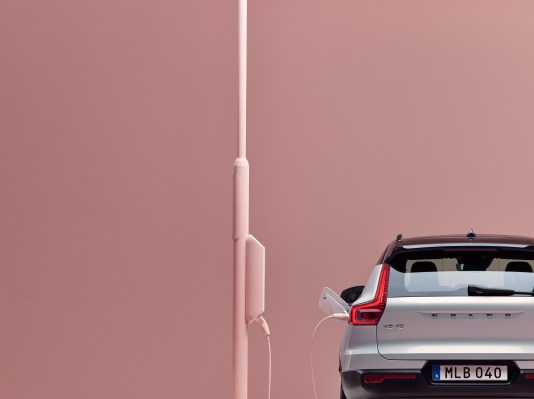Volvo to roll out a new electric vehicle every year through 2025 - 5 minutes read
 Volvo to roll out a new electric vehicle every year through 2025 – TechCrunch
Volvo to roll out a new electric vehicle every year through 2025 – TechCrunchVolvo Cars used the unveiling of the XC40 Recharge, its first electric vehicle, to lay out an ambitious business strategy that includes introducing a new EV every year through 2025 and slashing by 40% the carbon footprint of the lifecycle of every car and SUV it builds.
All of the changes are aimed at Volvo Cars’ target to become a climate-neutral company by 2040.
The goals laid out by Volvo Car Group President and CEO Håkan Samuelsson during a press conference Wednesday to launch the XC40 Recharge will change the structure of the company and affect its supply chain.
“We made safety a part of our brand and part of our company, we should do exactly the same with sustainability,” Samuelsson said Wednesday during the press conference.
Volvo plans to reach its goal by producing and selling electric and plug-in electric vehicles, cutting the carbon footprint of the lifecycle of its vehicles by 40% between 2018 and 2025 and spinning out its combustion engine unit.
A critical piece to hitting its target will be making more EVs available. The automaker plans to launch an all-electric car every year over the next five years. By 2025, it wants all-electric vehicles to represent 50% of global sales with the rest composed of hybrids.
As of this year, every new Volvo launched will be electrified, which means it could be a hybrid, plug-in electric (PHEV) or all-electric (BEV) vehicle.
To hit this target, every Volvo model will include a Recharge option. This means a plug-in hybrid or all-electric version will be available, according to the company. To further encourage electric driving, every Volvo Recharge plug-in hybrid model will come with free electricity for a year, provided through a refund for the average electricity cost during that period.
Volvo also plans to triple its manufacturing capacity and is now quickly ramping up its production globally, Björn Annwall, head of global commercial operations at Volvo, said during the press conference. Volvo is aiming for plug-in hybrid cars to make up 20% of total sales in 2020.
The company’s bid to reduce the carbon footprint of the lifecycle of its cars 40% between 2018 and 2025 will affect every aspect of how these vehicles are made, as well as its suppliers.
Today, the supply chain makes up one-third of the total carbon footprint throughout the lifecycle of a new vehicle, according to CTO Henrik Green. But switching to electrified vehicles to reduce tailpipe emissions increases the total lifecycle footprint of vehicles by two-thirds, primarily due to battery cell manufacturing.
“This is an industry challenge,” Green said, adding that lawmakers, utilities, automakers and battery cell manufacturers need to collaborate.
Volvo is targeting its supply chain to help it hit its goal as well as moving more toward renewable energy for its power. Reducing waste and standardizing materials to support recycling are also key to making the company more sustainable, according to Green.
Volvo isn’t ditching combustion engines completely. But it’s distancing itself from them.
Volvo Cars and its Chinese parent company Geely Holdings will merge their existing combustion engine operations into a standalone business. The move will “clear the way for Volvo Cars to focus on the development of its all-electric range of premium cars,” Samuelsson said.
“So we believe we will bring sustainability into our company, not as something to add on, because it’s good or something that is expected for us,” Samuelsson said. “We bring it into the company because we think it’s really good for our business. It will make our company grow faster, it will make our company stronger, exactly as safety made Volvo stronger.”
Source: TechCrunch
Powered by NewsAPI.org
Keywords:
Electric vehicle • TechCrunch • Volvo Cars • Rechargeable battery • Electric vehicle • Electric vehicle • Carbon footprint • Life-cycle assessment • Sport utility vehicle • Volvo Cars • Carbon neutrality • President • Chief executive officer • Håkan Samuelsson • Company • Supply chain • Brand • Sustainability • Volvo • Plug-in electric vehicle • Carbon footprint • Life-cycle assessment • Internal combustion engine • Electric vehicle • Automotive industry • Electric car • Electric vehicle • Multinational corporation • Hybrid electric vehicle • Volvo • WiLL • Hybrid vehicle • Plug-in electric vehicle • Plug-in hybrid • Electric car • Battery electric vehicle • Vehicle • Volvo • Scale model • Rechargeable battery • Plug-in hybrid • Electric car • Electric car • Volvo ReCharge • Plug-in hybrid • Mathematical model • Electricity • Electricity • Volvo • Manufacturing • Manufacturing • Advertising • Volvo • Volvo • Plug-in hybrid • Hybrid vehicle • Company • Carbon footprint • Product lifecycle • Vehicle • Supply chain • Supply chain • Carbon footprint • Life-cycle assessment • Chief technology officer • Electric vehicle • Exhaust gas • Life-cycle assessment • Ecological footprint • Electrochemical cell • Manufacturing • Industry • Public utility • Automotive industry • Electrochemical cell • Manufacturing • Volvo • Supply chain • Renewable energy • Electric power • Waste • Materials science • Recycling • Sustainability • Combustion • Volvo Cars • China • Parent company • Geely • Internal combustion engine • Volvo Cars • Research and development • All-electric range • Sustainability • Volvo •